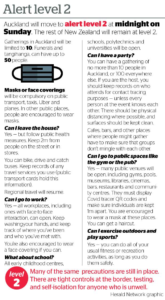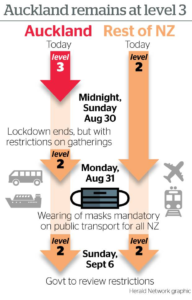Epidemiologist Dr Michael Baker wants high school students to wear masks to school when Auckland goes down to Covid-19 alert level 2 on Monday.
He says workers should also wear masks in meetings and in any other situations where people are less than 1 metre apart indoors – creating a kind of “alert level 2.5” particularly in Auckland where the virus is still in the community.
However, other experts disagree. Auckland University epidemiologist Dr Simon Thornley believes masks should not even be compulsory on buses and trains, and says the only place where there is strong evidence that they work is on planes.
The argument comes as one 67-year-old Mt Albert Grammar School parent, Mike Leonard, says he may have to move out of his house when his daughter returns to the school on Monday only four days after a second student at the school tested positive for the virus on Thursday.
Auckland Regional Public Health Service has asked the school’s 3000 students plus staff to get tested if they have not been tested since August 17.
At the same time, the service has told parents that “MAGS remains safe for all staff and students to return on Monday” because the student who tested positive on Thursday was actually infectious “more than two weeks ago”.
“The two things are contradictory. There must be a reason for why they want to test everyone,” Leonard said.
“My daughter just turned 18, she’s going to decide. But I’m 67 and I’ve got a problem. I don’t want her staying with me if she’s going to school, so I have got to find somewhere else she can stay, or maybe I leave the house.”
He said he trusted the Government in the first lockdown but no longer.
/cloudfront-ap-southeast-2.images.arcpublishing.com/nzme/NP7EEX3TBNESFIEKXAQRBK5LIA.jpg)
Baker, a public health professor at the University of Otago, supported the Auckland health service’s position and said it was “not incompatible” to say the school should reopen but all staff and students should be tested.
“The risk is negligible, but we still want to do a lot of testing just as a back-up measure,” he said.
But he said the risk could be reduced even further if everyone wore masks.
“That is an area where we haven’t yet really integrated masks into our alert system. The evidence is getting stronger that they can to some degree support physical distancing,” he said.
The current alert level 2 guidance is that people should stay 1 metre apart indoors and 2 metres apart outdoors. Baker said the rationale was to stop people spreading modules of the virus to other people.

If everyone is wearing masks, that is a far more effective way of dampening down transmission risk,” he said.
“High school students should wear masks at school, and if we have a workplace situation like a school, we would be requiring masks.
“We need to be using all low-cost effective means we can, and I think mask use should be part of that.”
Baker said he already wears a mask at meetings, although he takes it off when he is alone in his office.

However, Thornley, who has promoted a “Plan B” for controlling Covid that would have avoided lockdowns, said scientific trials had not found that mask use reduced the spread of similar viruses.
/cloudfront-ap-southeast-2.images.arcpublishing.com/nzme/KFIIV3USQNF73KLSBIXIKBT47Y.jpg)
“They were very disappointing in terms of influenza control. There was a lot of work done on that,” he said.
“I know that as the pandemic has evolved, the focus has gone on the observational evidence, and some of that is suggesting that mask use does reduce infection, but in the epidemiology world it’s generally considered that trials are more reliable evidence.”
He said there was evidence masks could reduce infection on aircraft “because it’s such a confined space and quite a long period of travel, and there is uncertain risk from people coming from different countries”.
But that did not apply on buses and trains where “the duration of the trip is much shorter and the level of ventilation is probably higher”.
In contrast to the 1918 influenza epidemic in which the average age of death was in the 20s, he said the average age of death from Covid-19 was virtually the same as the average age of death from all causes in each country.
“Yes, it looks alarming when you look at these spikes in mortality, but over a longer period of time as this draws on, I think we are not going to see a dramatic increase of years lost,” he said.
Meanwhile, the health service said 750 people from the Mt Albert Grammar community had been tested by 5.30pm today.
“Nearly two thirds of those tests have been processed and all are negative,” it said.
/cloudfront-ap-southeast-2.images.arcpublishing.com/nzme/CGUUQRKYBVAJ3NTR2YCPYGK7FU.jpg)
The school’s headmaster, Patrick Drumm, said testing was “recommended not mandatory due to the low risk after three weeks away from school”.
The Ministry of Education says schools are exempted from the limit of 10 people on gatherings in Auckland in level 2, but must apply the 10-person limit to anyone coming on to a school site, such as spectators at sports events.
“At alert level 2 a school ball would be considered a gathering as the purpose of the event is not education. It is a social event. Therefore the above advice for gatherings would need to apply,” it says.
Field trips and camps “could potentially go ahead but will need careful planning”.

Leave A Comment